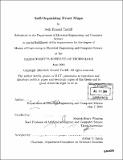Self-organizing event maps
Author(s)
Tardiff, Seth Ronald, 1981-
DownloadFull printable version (4.542Mb)
Other Contributors
Massachusetts Institute of Technology. Dept. of Electrical Engineering and Computer Science.
Advisor
Patrick Henry Winston.
Terms of use
Metadata
Show full item recordAbstract
To take further steps along the path toward true artificial intelligence, systems must be built that are capable of learning about the world around them through observation and explanation. These systems should be flexible and robust in the style of the human brain and little precompiled knowledge should be given initially. As a step toward achieving this lofty goal, this thesis presents the self-organizing event map (SOEM) architcture. The SOEM architecture seeks to provide a way in which computers can be taught, through simple observation of the world, about typical events in a way that organized according to events that are observed by the system. In this manner, the event map produces clusters of similar events and provides an implicit representation of the regularity within the event space to which the system has been exposed. As part of this thesis, a test system that makes use of self-organizing event map architecture has been developed in conjunction with the Genesis Project at the Computer Science and Artificial Intelligence Laboratory (CSAIL) at MIT. This system receives input through a natural-language text interface and, through repreated training cycles, becomes capable of discerning between typical and exceptional events. Clusters of similar events develop within the map and these clusters act as an implicit is flexible and robust. The self-organizing event map, as a data structure, stores a plane of event models that are continually updated and form of the more commonly used (and explicit) notion of scripts and capability lists. For example, a trained map may recognize that dogs often run, but never fly. Therefore if a new input is received that describes a flying dog, the map would be capable of identifying the event as exceptional (cont.) (or simply erroneous) and that further attention should be paid. By using clusters of similarity as an implicit representation, the self-organizing event maps presented here more accurately mimic natural memory systems and do not suffer from being tied to the limitations of a specific explicit representation of regularity.
Description
Thesis (M. Eng.)--Massachusetts Institute of Technology, Dept. of Electrical Engineering and Computer Science, 2004. Includes bibliographical references (leaves 61-62).
Date issued
2004Department
Massachusetts Institute of Technology. Department of Electrical Engineering and Computer SciencePublisher
Massachusetts Institute of Technology
Keywords
Electrical Engineering and Computer Science.